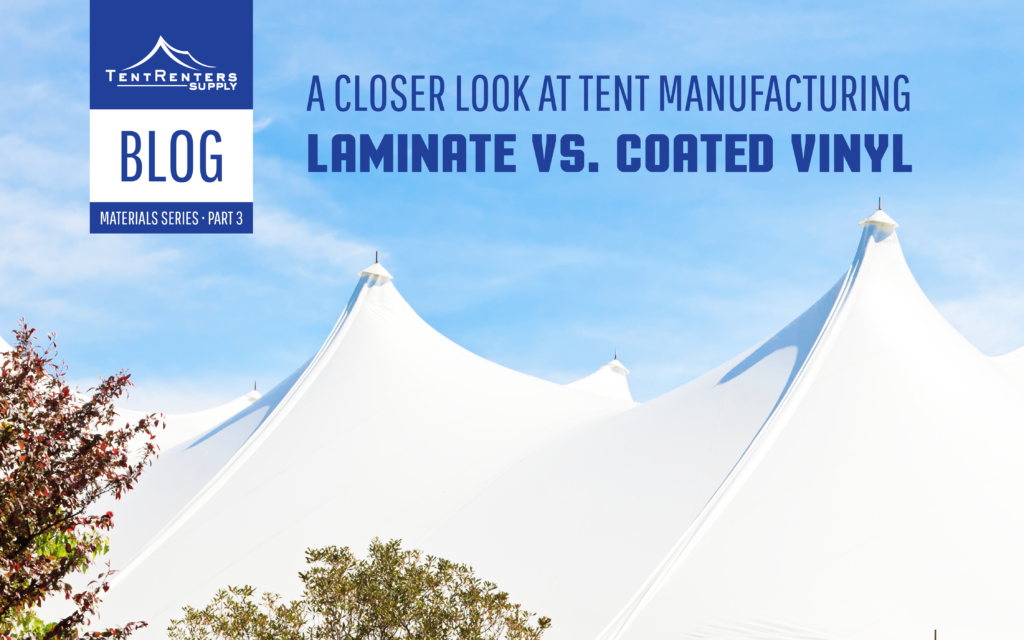Built to Last: A Comprehensive Guide to Tent Material and Performance, tent material
Part 3: A Closer Look at Tent Manufacturing: Laminate vs. Coated Vinyl
If you’re about to invest in a custom tent for your business or event, it’s important to know the differences in the vinyl manufacturing process to get the best product for your needs.
Tents are an essential part of any outdoor event, providing shelter and protection from the elements. When it comes to tent manufacturing, choosing the right material is crucial. Two popular options are laminate and coated vinyl, each with its own unique properties and advantages.
This is the third installment of our series, Built to Last: A Comprehensive Guide to Tent Material and Performance. In this article, we delve into the manufacturing processes of laminate and coated vinyl tents, exploring their characteristics and helping you make an informed decision when considering your tenting needs.
Understanding Laminate Tents
Laminate tents are constructed using a lamination process that combines multiple layers of materials. The core fabric is called scrim—a woven polyester— which offers strength and durability.
To enhance its weather resistance, the polyester fabric is laminated with various coatings, such as polyurethane (PU) or polyethylene (PE).
The lamination process involves bonding the fabric and coating together under controlled heat and pressure, resulting in a unified, water-resistant material.
Laminate tents are known for their excellent waterproofing capabilities, breathability, and resistance to UV radiation.
What Are the Advantages of Laminate Tents?
At Tent Renters Supply, we consider several benefits to help guide our customers in their selection process, factoring in these characteristics:
- Waterproofing: Laminate tents protect against rain and moisture, keeping you dry during inclement weather.
- Breathability: The laminated materials allow air circulation, reducing condensation and maintaining a comfortable interior environment.
- UV Resistance: The lamination process enhances the tent’s resistance to harmful UV rays, prolonging its lifespan and protecting occupants
- Lightweight: Due to their construction with lightweight fabrics, laminate tents may be easier to transport, install, and take down, depending on the application
Exploring Coated Vinyl Tents
Coated vinyl, on the other hand, uses a different manufacturing approach.
During the manufacturing process, the scrim is treated with a specialized machine that evenly spreads the vinyl coating. This coating is often a combination of polyvinyl chloride (PVC) and other additives, providing flexibility and strength to the tent material.
Coated vinyl tents are widely used for commercial purposes, including large event tents and military shelters, due to their robust construction and weather resistance.
Advantages of Coated Vinyl Tents:
- Durability: Coated vinyl tents are known for their exceptional durability, capable of withstanding rigorous use and harsh weather conditions.
- Water Resistance: The vinyl coating creates a waterproof barrier, ensuring protection from rain and moisture.
- Versatility: Coated vinyl tents are highly versatile and find applications in various settings, from camping and outdoor events to industrial and military uses.
- Easy Maintenance: The vinyl coating makes these tents relatively easy to clean and maintain, ensuring longevity.
Choosing the Right Tent Material for Your Needs
When selecting between laminate and coated vinyl, several factors come into play. Consider the intended use of the tent, the expected weather conditions, and the specific requirements of your outdoor event. Laminate tents are a sound option for a durable, high-quality tent that also is budget-conscious.
Coated vinyl tents, on the other hand, excel in demanding environments where durability and longevity are necessary.
It’s difficult to spot with the untrained eye, but coated vinyl is typically smoother in appearance than laminate vinyl when you perform a close-up, side-by-side comparison.
That’s because laminate vinyl layers are pressed together with the scrim in the center, while the other process coats or spreads the vinyl material (think of a paste) onto the scrim itself.
Make the Choice with Tent Renters Supply
The choice between laminate and coated vinyl tents depends on your needs, preferences, and budget. Both materials offer unique advantages, whether it’s the lightweight and breathable nature of laminate tents or the durability and versatility of coated vinyl tents.
At Tent Renters Supply, our team can help guide you through your material selection process, ensuring you get the best outcomes to protect your investment.
To learn more, contact Tent Renters Supply today.

